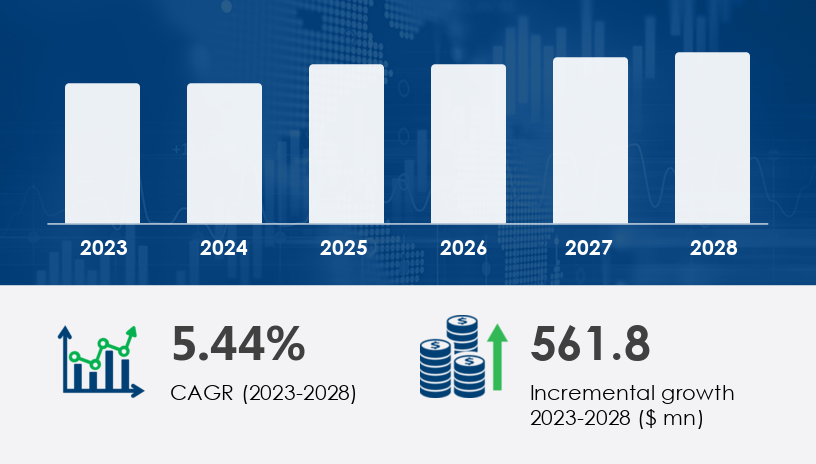Vertigo Drugs Market Size, Growth, and Trends 2024-2028
The Global vertigo drugs market is projected to grow by USD 561.8 million between 2023 and 2028, with a CAGR of 5.44%. The market is driven by rising demand in emerging economies, increasing healthcare expenditure, and the adoption of digital health solutions. The presence of affordable generic drugs is further expanding accessibility, especially in regions with limited healthcare resources.

For more details about the industry, get the PDF sample report for free
Market Segmentation
By Type
- Peripheral Vertigo
- Central Vertigo
By Distribution Channel
By Geography
- North America
- Europe
- Asia
- Rest of World (ROW)
By Type Insights
The peripheral vertigo segment is expected to experience significant growth. Peripheral vertigo is associated with disorders of the inner ear vestibular labyrinth or semicircular canals, which control balance. Around 80% of vertigo cases are peripheral, often caused by inner ear infections, injuries, and medications like aminoglycoside antibiotics and cisplatin. Conditions such as Meniere’s disease also contribute to this segment’s expansion.
Regional Analysis
North America will account for 42% of global market growth, driven by a well-developed healthcare infrastructure, a large geriatric population, and high healthcare expenditure. Companies like Viatris, Amneal Pharmaceuticals, and Epic Pharma are investing in R&D to introduce new vertigo treatments with improved efficacy and safety. The demand for outpatient care and digital health solutions is further boosting market expansion in this region.
Market Dynamics
Key Market Drivers
- Growing Demand in Emerging Economies: Countries like India, China, Brazil, South Africa, Indonesia, and Mexico are increasing healthcare spending on vertigo treatments, leading to higher demand for medications such as corticosteroids, antibiotics, and vestibular suppressants.
- Expanding Geriatric Population: Aging populations in key markets are highly susceptible to vestibular disorders, increasing the demand for specialized vertigo treatments.
- Clinical Trials & Innovations: Companies like NeuroEquilibrium and Altamira Therapeutics are testing new vertigo drugs, including nasal sprays and wearable sensors, to improve treatment effectiveness.
Market Trends
- Integration of Digital Health Solutions: Telehealth platforms are being used for remote monitoring and teleconsultation services, improving access to care. Healthcare providers are also investing in balance disorder clinics and specialized vestibular therapy.
- Development of New Medications: Clinical trials are underway for new vertigo drugs, including corticosteroids, antibiotics, and vestibular suppressants, as well as generic drugs that offer affordable treatment options.
Market Challenges
- Growing Competition from Generic Drugs: The expiration of patents for major vertigo medications has led to an influx of low-cost generic alternatives, impacting revenue growth for branded drug manufacturers.
- Financial Burden of Treatment: The high cost of branded medications and long-term use of benzodiazepines create financial challenges for patients, particularly in regions with limited insurance coverage.
Get more details by ordering the complete report
Key Players in the Market
- AdvaCare Pharma
- Altamira Therapeutics Ltd.
- Amneal Pharmaceuticals Inc.
- Endo International Plc
- Epic Pharma LLC
- F. Hoffmann La Roche Ltd.
- GlaxoSmithKline Plc
- Indicus Pharma
- Intas Pharmaceuticals Ltd.
- Jubilant Pharmova Ltd.
- Lupin Ltd.
- Novartis AG
- Otonomy Inc.
- Pfizer Inc.
- Sensorion
- Sound Pharmaceuticals
- Sun Pharmaceutical Industries Ltd.
- Suven Life Sciences Ltd.
- Teva Pharmaceutical Industries Ltd.
- Viatris Inc.
Recent Developments
- Altamira Therapeutics is developing ALTA-5206 for vertigo treatment.
- Altamira Therapeutics is conducting clinical trials for Betahistine nasal spray (Vertigenius)